In a voice that was at first inaudible, Senator Edward M. Kennedy pleaded guilty this morning in district court to a charge of leaving the scene of an accident after knowingly causing injury to Miss Mary Jo Kopechne without making himself known. Judge James A. Boyle imposed a suspended two-month sentence to the house of correction at Barnstable, with the comment that “the defendant has already been and will continue to be punished far beyond anything this court can impose.”
The courtroom was crowded with spectators, most of the reporters. Mrs. Edward M. Kennedy, clad in a black and white coat, before the arraignment and sat in the front row of one of the jury boxes.
Mr. Kennedy followed her and sat in the customary defendant’s chair, with his lawyers, Robert G. Clark Jr. of Brockton and Richard J. McCarron of Edgartown, sitting inside the bar directly in front of him.
Thomas A. Teller, the clerk of the court read the complaint and asked for the senator’s plea. He answered once in an indistinct voice, then repeated the word “guilty” in a louder and firmer tone.
Then Walter E. Steele, the county prosecutor, called Chief Dominick Arena of the Edgartown police, the complainant in the case, to the stand to summarize the prosecution’s case for the court and for the defendant, a customary procedure when there is a guilty plea.
The chief told of learning of the accident at 8:20 on the morning of July 19 and of finding the body of Miss Kopechne in Mr. Kennedy’s car, which was submerged in Pocha Pond, where it had plunged after being driven off the Dike Bridge on Chappaquiddick.
He told the court that Senator Kennedy had advised him that the accident had happened sometime 11:15 the night before but that the senator had not reported the accident until sometime after 9:30 the following morning.
The chief said that there was no evidence of negligence on the senator’s part, but that he did have ample opportunities to report the accident before he actually did.
Mr. McCarron said that the defense had no questions to ask the chief.
Recommended Suspended Sentence
Then came the matter of recommendations for disposition. Both Mr. McCarron and Mr. Steele recommended a suspended sentence, and both cited, as support for their contentions, the character and reputation of the senator. Mr. Steele said that the commonwealth believed that the ends of justice would be served by a suspended sentence.
Judge Boyle made his disposition of the case after ascertaining that there was no evidence of a deliberate attempt to conceal the identity of the senator.
The ordeal in the courtroom was over, but the senator had to face yet another one, the crush of reporters and spectators crowding the front walk of the courthouse and spilling out over Main street. He was seen to speak a few words into a microphone as he made his way through the crowd flanked by a group of state police troopers and other officers, but his words did not carry far. He made it to the car that was waiting in front, and departed.
The decision to waive the hearing on the issuance of the complaint was announced in an unexpected press conference called for 9:30 last night by Mr. Kennedy’s lawyers.
Robert G. Clark Jr. of Brockton made the announcement, after emphasizing that he would read it but would answer no questions about it.
“July 24, 1969, at the request of Edward M. Kennedy,” he began, “a written waiver of the request to be heard in objection to the issuance of a complaint will be filed with the clerk of district court of Dukes County tomorrow morning.
“Upon the filing of this written waiver, it is assumed that in the normal course of events the clerk will issue the complaint requested by the commonwealth. Mr. Kennedy will be present in Edgartown tomorrow morning, July 25, 1969, to accept service of this complaint on the charge contained in the complaint held at district court at 9 a.m., and that Mr. Kennedy will be present at such arraignment.”
Read Statement for Reporters
Mr. Clark, who was accompanied by his son, Robert G. Clark 3rd, and Richard J. McCarron, the Edgartown lawyer who had originally filed the request for a hearing on the issuance of the complaint, read through the statement twice, for perhaps 50 reporters, many of whom left their dinner tables upon receiving word of the conference shortly before 9.
When he was through he had left the hall, a scramble began for the 35 seats that would be available to the press in the courtroom this morning. Finally, Mr. Steele took the names of all those present at the conference, saying that sometime during the night he would attempt to work out an equitable arrangement for a press pool.
The conference last night and the court proceedings this morning climaxed a week, during which, as one off-Island reporter himself put it, it seemed as if the Island might sink under the weight of visiting newsmen.
“Today is the first day I’ve felt like going out to South Beach and just yelling at the top of my lungs,” Chief arena said on Wednesday afternoon, following his second meeting with the press of the day. The press in this instance was composed of about 35 newspapers and television reporters, photographers and cameramen. Their number was varied, usually upward, through the week, and one estimate is that there are half a hundred newsmen on the Island, all concerned with the story of the accident last Friday night or early Saturday morning, in which a car operated by the senator was driven off the Dike Bridge on Chappaquiddick, and the senator’s companion, Miss Mary Jo Kopachne of Washington, D.C., was drowned.
Because the accident was not discovered and reported until about 8 o’clock Saturday morning, a complaint was filed with the clerk of district court Monday, charging Senator Kennedy with leaving the scene of an accident without reporting it within a reasonable period of time.
A hearing on the issuance of that complaint was to be held by the clerk, Thomas a. Teller, this Monday afternoon until last night’s development cancelled it.
One of the few hard facts to emerge from the press conferences during the week was the announcement that Mr. Clark, a former district court judge in Brockton, and his son would be acting in concert with Mr. McCarron on the case.
Senator Kennedy is not required to be present at the hearing.
Meanwhile, the period from July 19, when the accident was discovered, to July 28, the date of the hearing was providing to be too long for the news media of the nation to lie quiescent while the snailpaced processes of the law transpired.
The story of the accident has grown into a story of getting The Story. The circumstances surrounding the accident contained more than enough unknowns to whet the appetites of newsmen, for whom the legendary Kennedy family are a staple source of news.
Never on the Island has a single incident been the inspiration of so many individual investigations. The digging for facts that began on Saturday has continued unabated since. The world, it seems, wants to know more than the fact that there was a tragic accident.
Continual Questioning
The pressure of the continual questioning has been particularly directed toward Chief Arena, whose desire to seek relief from that pressure by yelling at South Beach was expressed despite the fact that, as he admitted to the newsmen, he had finally had to take a tranquilizer on Wednesday.
The notion of the twice-a-day press conferences conceived by Cornelius Hurley of the Associated Press would, it was hoped, take some of the pressure off the chief, who until Tuesday had been besieged by reporters almost around the clock. The press conferences may have helped some time to continue his investigation of this case and to hand other police business were concerned, but it has also served to polarize the pressure and to emphasize the repetitiveness of the questions, which have gone on and on hammering at the same mysteries.
Here are some of the main ones:
Why was the accident not reported for nearly eight hours, either by the senator or by Paul Markham, the former United States Attorney in Massachuesetts, who was a sailing companion, or by the senator’s cousin, Joseph F. Gargan, who had leased the Sidney K. Lawrence cottage on Chappaquiddick for the week?
What are the implications of the handbag shaped like a lunchpail found in the Kennedy car, belonging not to Miss Kopechne but to Miss Rosemary Keough, another of the party of six young women who had been staying at the Dunes for the weekend, in rooms engaged for them by Mr. Gargan?
What was the nature of the party held that Friday night at the Lawrence cottage, presumably attended by the senator and Miss Kopechne?
What was the senator’s condition when he left the party?
What is Lieut. George Killen, the state police detective attached to the district attorney’s office, looking for, now that he has been asked by the chief to join the investigation?
What significance will the testimony of Christopher S. Look Jr. have on the case? It was reported that Mr. Look had observed a 1967 Oldsmobile hesitating at the intersection of Tom’s Neck Road (the road to the Dike) and Chappaquiddick Road at 12:40 the night of the accident, a considerable period of time after the time cited by Senator Kennedy in his statement to the police as the hour he had started out with Miss Kopechne to catch the Chappy ferry back to Edgartown.
None of these questions could be answered, either by the chief or by Walter E. Steele, the county prosecutor, who has sat with the chief at the press conferences and advised him on points of law.
Topics under discussion at a press conference do not proceed in a consecutive fashion. Each reporter, following his own system of logic, grasps an opportunity to question, and the topics bounce in and out of discussion like so many super balls.
There are recurring themes, however, that reveal the trends of reportorial thinking, and the tenor of that thinking is reflected in the answers set forth by the chief and Mr. Steele.
A Motor Vehicle Case
Chief Arena reminded the reporters several times on Wednesday that as far as he is concerned, the Kennedy case is a motor vehicle one which he is attempting to treat exactly in the same manner he would a case involving a person without the fame and political stature of the senator.
From the evidence presented him, he said, he could not make a charge of negligence, which in any event, in a court of law, would require witnesses that could characterize the operation of the car as being in some way erratic or bizarre. In the required accident report filed yesterday, it was noted that the car had been travelling about 20 miles an hour when the accident occurred.
Much was made over the suspension of the senator’s driver’s license by the state Registrar of Motor Vehicles, until it was explained to the reporters that this is a routine measure taken in connection with accidents in which there has been a fatality, and that the Registrar’s finding of “fault” on the senator’s part could not be construed as fault in the criminal sense.
The chief indicated that he had felt the statement he had left behind with the police when he was flown back to Hyannis by Robert J. Carroll of Edgartown to consult his lawyer had been adequate under the circumstances. He said that he had question neither the senator nor Mr. Markham nor Mr. Gargan about the events either before or after the accident.
Neither had he question Miss Keough about the presence of her handbag in the car, and she had offered no information. He said that a man saying that he was a friend of hers had come to the station to claim the bag.
It was further indicated that what information Mr. Look has had becomes a part of the prosecution’s case, and neither the chief nor Mr. Steele would comment upon it.
As for the investigation being conducted by Lieutenant Killen, neither man was prepared to go ant further into the particulars. The reporters wanted to know if other charges against the senator were being considered. “As to the operation of the car,” Mr. Steele said, “it is clear to us there is no case of negligent driving.” But he confirmed the fact that the investigation is not closed, “but not because of any particular offense.” The chief did say on Wednesday that he had not had any report from Lieutenant Killen.
A Whale of a Sale
So the questioning went until yesterday, when there were no press conferences, the morning one cancelled ostensibly because the Federated Church parish house was given over to the church’s annual Whale of a Sale, but since the afternoon conference was cancelled, too, it was pretty clear that the chief and Mr. Steele felt they had said all that they could say - several times over.
Meanwhile the digging by reporters continued, and more and more reporters have arrived, representing papers and magazines not just from the Eastern Seaboard and such expected places as Boston, Providence, New York and Washington, but such places as Chicago, Detroit, Los Angeles, Cleveland, Italy, and even a gentleman from the London Times.
The publicity has put Edgartown in the limelight, given somnolent Chappaquiddick a place in everybody’s gazetteer, and turned the chief into a television personality. As someone said, a lot of strangers have found out this week that Dominick Arena is not a skating rink.



 1 comment
1 comment
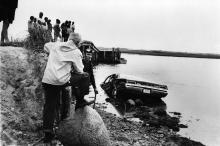
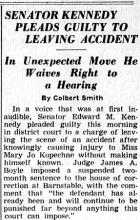
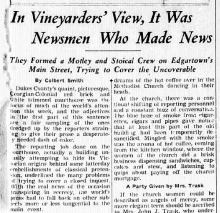
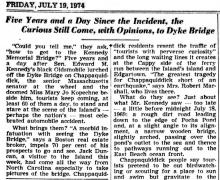
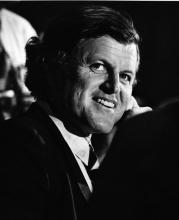
Comments (1)
Comments